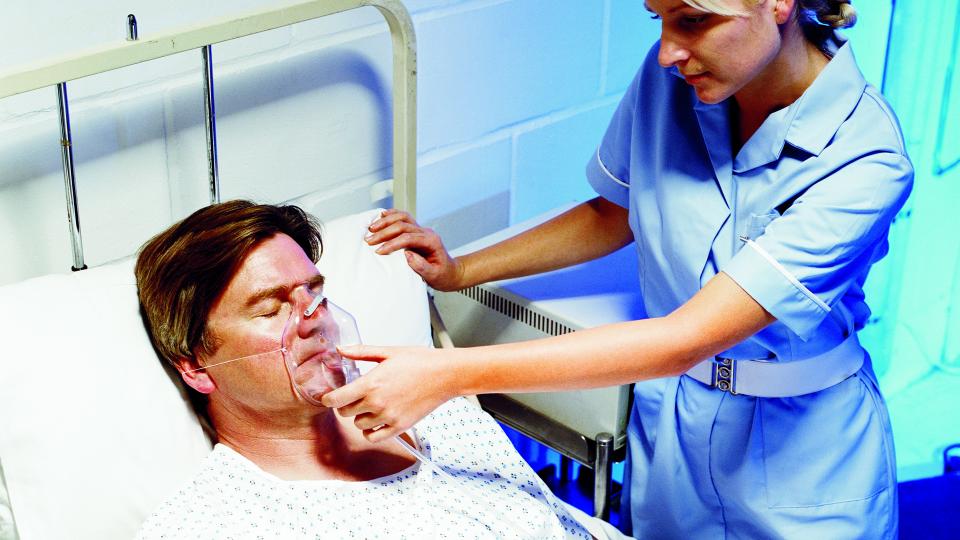- Continuing professional development (CPD)
Detection and Response to the Deteriorating Adult Patient
Overview
This credit-bearing course has been designed for healthcare practitioners caring for patients receiving Ward Care (previously Level 0 and Level 1 Care).
NB: For those caring for patients requiring Enhanced Care (Level 1a) or Level 2 Care, you may wish to apply for Introduction to Care of the Critically Ill Adult (Enhanced and High Dependency Care).
It will enable you to gain confidence and competence in the identification of patients who are at risk of clinical deterioration, facilitating the escalation of care in an appropriate and timely manner.
Simulation of patient scenarios and clinical skills practice in the simulation centre will be key to the delivery of this course which is offered at both our Reading and West London campuses.
Course requirements: Evidence of study at Level 6 (Degree Level).
Cost and funding: This fee covers the full course cost.
- Sept 24 - Aug 25 fees: £900
- Sept 25 - Aug 26 fees: TBC
Credits: 20
Assessment method:
- Essay 100%
- Clinical Competencies and OSCE – both must be passed in order to successfully pass the course overall.

Study dates and times
This course is taught on day release, select a start date to see the study days:
Study days are from 9am to 5pm.
The course will focus on:
Assessment in acute care
- Systematic approach to clinical assessment using the ABCDE approach
- Recognising changes in clinical status
- Using National Early Warning Score (NEWS2)
- SBAR as a multidisciplinary communication tool.
The patient with breathing difficulties
- Airway management, using adjuncts to support the airway
- Airway and breathing assessment
- Acute, chronic, and acute exacerbations of respiratory problems
- Identifying problems with oxygenation - hypoventilation, hypoxaemia, V/Q mismatch
- Recognising the need for immediate interventions to support the patient with breathing difficulties - positioning, oxygen therapy, emergency oxygen use in adults, nebulisers. Management of Acute Asthma and COPD in Adults.
The patient with low blood pressure
- The physiological factors involved in maintenance of blood pressure and cardiac output
- Cardiovascular assessment
- Recognition of signs of reduced organ blood flow
- Measuring and interpreting, blood pressure, mean arterial pressure, pulse characteristics
- Recognising potential septic, hypovolaemic, cardiogenic causes of altered cardiac output
- Assessment of the patient with cardiac/circulatory problems, early identification, recognition and of 'sepsis'
- Understanding fluid challenge principles.
The patient with low urine output
- Recognising low urine output
- Mechanisms of acute kidney injury. Biochemical alteration with deteriorating renal function. Assessing and management strategies for low urine output
- Management of fluid balance.
The patient with altered conscious level
- Common causes of reduced consciousness
- Electrolyte (and glucose) balance (recognising diabetic keto-acidosis)
- Assessment of the patient with neurological deficit
- Immediate emergency management of a patient with a disordered conscious level.
Managing medical emergencies, transfer to a higher level of care
- Transfer of the acutely ill patient.
National and professional strategies in acute care
- Professional values with an emphasis on Competence, Care, Courage and Communication, in meeting the needs of the patient at risk of deterioration
- Professional and national strategies.
Teaching staff

Pamela Arasen
I started my career as a registered nurse after completing a Diploma in Nursing at St Bartholomew School of Nursing, City University in 2005. I spent a few years working in Acute Medical/Surgical wards and A&E, and continued my education pathway in a BSc in Cardiorespiratory Care, before moving to Critical Care at West Middlesex University Hospital. I specialised in the Critical Care Outreach Team at King’s College Hospital, after completing my MSc in Advanced Practice in Critical Care in 2015.
In 2018, I was appointed as a Lecturer Practitioner in Intensive Care at UWL teaching on the ITU course. I had a joint appointment at the London Northwest Healthcare Trust as the Lead in Education in Intensive Care Nursing, where I introduced the in-house Intensive Care Adult course with UWL partnership during the COVID-19 pandemic. After the completion of the Academic Professional Apprenticeship,
I currently work as a Senior Lecturer in Advanced Clinical Practice and the Course Lead in the Advanced Clinical Practitioner Degree Apprenticeship (L7) and the MSc in ACP-direct entry (L7).
My special interests are Critical Care, Education and Career Development in Nursing.
I started my career as a registered nurse after completing a Diploma in Nursing at St Bartholomew School of Nursing, City University in 2005. I spent a few years working in Acute Medical/Surgical wards and A&E, and continued my education pathway in a BSc in Cardiorespiratory Care, before moving to Critical Care at West Middlesex University Hospital. I specialised in the Critical Care Outreach Team at King’s College Hospital, after completing my MSc in Advanced Practice in Critical Care in 2015.
In 2018, I was appointed as a Lecturer Practitioner in Intensive Care at UWL teaching on the ITU course. I had a joint appointment at the London Northwest Healthcare Trust as the Lead in Education in Intensive Care Nursing, where I introduced the in-house Intensive Care Adult course with UWL partnership during the COVID-19 pandemic. After the completion of the Academic Professional Apprenticeship,
I currently work as a Senior Lecturer in Advanced Clinical Practice and the Course Lead in the Advanced Clinical Practitioner Degree Apprenticeship (L7) and the MSc in ACP-direct entry (L7).
My special interests are Critical Care, Education and Career Development in Nursing.
Study and career progression
This can be taken as a standalone module or the credits can be used towards the:
- PgCert/PgDip/MSc Clinical Practice (first module in pathway can be studied at Level 6 - maximum of 20 credits) - badged awards available.
How to apply
We recommend your application is submitted to the University at least two weeks prior to the start of the course.
After your application is accepted and you have been offered a place on the course, you will be sent information about how to enrol. You must complete enrolment before your course starts.
Apply for this course
Apply nowContact us
For more information about our CPD courses please get in touch with Dr Claire Anderson, Associate Dean (Berkshire), College of Nursing, Midwifery and Healthcare:
Browse more CPD courses

Find out more about Continuing Professional Development with the College of Nursing, Midwifery and Healthcare and see the range of courses on offer.




